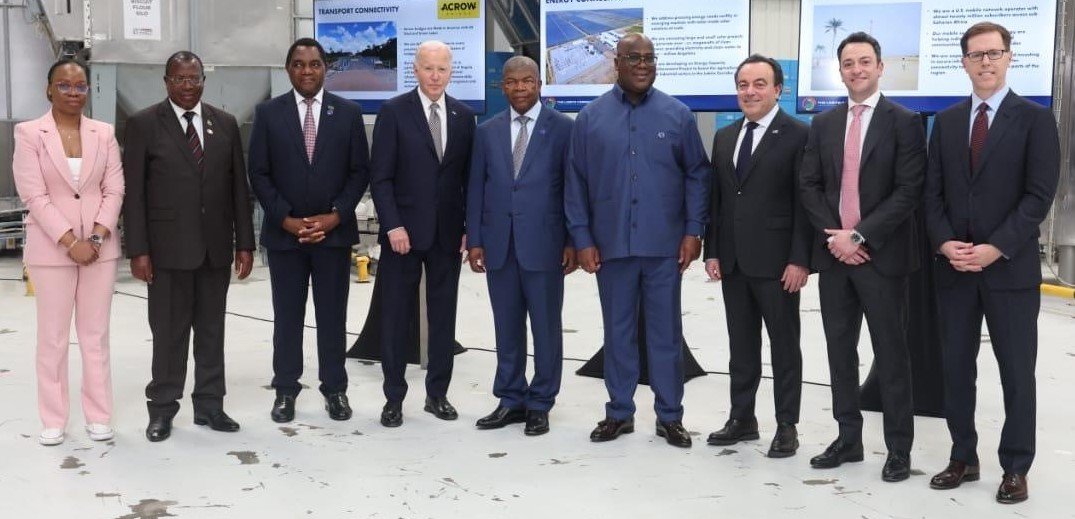During his recent visit to Angola, US President Joe Biden praised Africell
Telecommunications Company for its significant contributions to the Lobito Corridor, which aims to improve connectivity between the Atlantic and Indian Oceans.
President Biden praised Africell CEO Ziad Dalloul for the company’s efforts to provide local communities with fast mobile and fintech services.
Dalloul pointed up Africell’s unique position as Africa’s only US-owned mobile operator, and for the company’s collaboration with the US government on initiatives to improve financial security for agricultural workers.
Africell is also planning to release a documentary, “Lobito Bound,” in 2025 to highlight the Corridor’s significance.
President Joe Biden became the first sitting U.S. president to visit the Republic of Angola, and the first U.S. president to visit sub-Saharan Africa since 2015.
According to the White House, President Biden’s visit was intended to “celebrate the transformation and deepening of the U.S.-Angola relationship”, as well as highlighting advances in ‘Lobito Corridor’, a multilateral initiative to “connect the Atlantic and Indian Oceans” through investment in transportation, communications and other vital infrastructure in Angola, the Democratic Republic of Congo (DRC), Zambia and Tanzania.
On Tuesday 4 December, President Biden and President Joao Lourenço of Angola travelled to Lobito to co-host a summit at which leaders from the Democratic Republic of the Congo (DRC), Zambia and Tanzania evaluated progress and are committed to further invest in the Lobito Corridor region.
During the summit, Africell CEO Ziad Dalloul, accompanied by Afrimoney Angola director Kátia da Conceição, briefed the heads of state on Africell’s contributions to Lobito Corridor through the provision of fast and secure mobile and fintech services to communities along its route.
 Addressing President Biden, President Lourenço, President Félix Tshisekedi (of DRC), President Haikande Hichilema (of Zambia) and Vice President Dr Philip Mpango of Tanzania, Ziad Dalloul said:
Addressing President Biden, President Lourenço, President Félix Tshisekedi (of DRC), President Haikande Hichilema (of Zambia) and Vice President Dr Philip Mpango of Tanzania, Ziad Dalloul said:
“Africell is the only US-owned mobile network operator in Africa. We are the digital partner for the Lobito Corridor. We have been working closely with the US government and other private sector companies to boost the Lobito Corridor through enhanced digital connectivity”.
He continued: “For example, we are working with USAID to teach agricultural workers in Angola on how to use the innovative technology of mobile money to earn more, save more, and be more financially secure.
“We are also working with US EXIM, which has made a preliminary commitment of $100 million to finance our network expansion in Angola and DRC. This investment will potentially bring millions more people within the scope of 3G, 4G and 5G mobile coverage”.
Africell’s work in the region aligns with the U.S. government’s ‘Digital Transformation with Africa’ initiative, which aims to create secure internet infrastructure on the continent. In Angola, for example, Africell’s network is built on exclusively by western equipment.
Speaking after the interaction with the heads of state, Kátia da Conceição said that it was an honour to present the work of Afrimoney Angola. She said:
“Financial inclusion is the natural counterpart to digital access. The Afrimoney platform capitalises on Africell’s state of the art mobile network to give millions of Angolan (and Congolese) consumers easy, safe and convenient tools for saving and earning money. Afrimoney’s innovative work in Angola is helping to stimulate economic growth and development, which are core aims of the Lobito Corridor project. Being able to explain this directly to the leaders of the U.S., Angola, DRC, Zambia and Tanzania was a unique and exciting opportunity”.
Africell’s investment in the Lobito Corridor extends beyond the core business of rolling out technology infrastructure in Angola, DRC and potentially other countries in future. In mid-2024, Africell commissioned an original adventure documentary about the Lobito Corridor. The feature-length film, Lobito Bound, which will be released in early 2025, follows British explorer Dwayne Fields on a 4,000km journey by road and rail from Tanzania to Angola, highlighting the human impact of the Corridor and emphasising its scale and significance to a popular audience.











































































































































































































































































































































































































































































































































































































































































































































































































































































































































































































































































































































































































































































































































































































































































































































































































































































































































































































































































































































































































































































































































































































































































































































































































































































































































































































































































































































































































































































































































































































































































































































































































































































































































































































